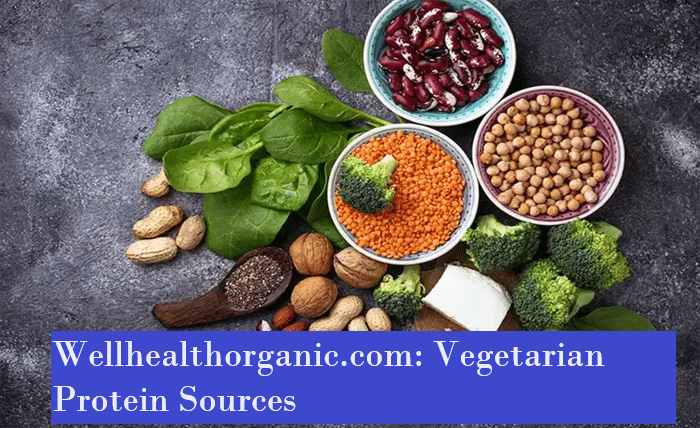In today’s health-conscious world, the importance of protein in a balanced diet cannot be overstated. While many associate protein with meat, there are plenty of nutrient-rich vegetarian options available that can help you meet your protein needs without compromising your dietary preferences. Whether you’re a vegetarian looking to increase protein intake or someone exploring healthier eating habits, incorporating these high-protein foods into your diet can significantly enhance your overall well-being.
1. Lentils
Lentils are a powerhouse of plant-based protein, offering around 18 grams of protein per cooked cup. They are also rich in fiber, which aids digestion and helps regulate blood sugar levels. Lentils are incredibly versatile and can be used in soups, stews, salads, and even veggie burgers.
2. Quinoa
Quinoa is a complete protein source, meaning it contains all nine essential amino acids our bodies need. With about 8 grams of protein per cooked cup, quinoa is not only protein-packed but also gluten-free and high in fiber. It serves as an excellent base for salads or a nutritious substitute for rice.
3. Chickpeas
Chickpeas, also known as garbanzo beans, are another excellent source of vegetarian protein, providing approximately 15 grams of protein per cooked cup. They are a staple in Mediterranean and Middle Eastern cuisines and can be enjoyed roasted as a snack, blended into hummus, or tossed into salads and curries.
4. Greek Yogurt
Greek yogurt is a dairy-based option that boasts high protein content, with about 15-20 grams of protein per 6-ounce serving. It is thicker and creamier than regular yogurt due to the straining process, which removes excess liquid whey and lactose. Greek yogurt is a versatile ingredient that can be enjoyed on its own, blended into smoothies, or used as a substitute for sour cream in various recipes.
5. Tofu
Tofu, or bean curd, is a popular soy-based protein source widely used in vegetarian and vegan cooking. It offers approximately 10 grams of protein per 3-ounce serving. Tofu absorbs flavors well and can be grilled, stir-fried, or blended into smoothies for a protein boost. It is also rich in calcium and iron, making it a nutritious addition to any diet.
6. Edamame
Edamame are young soybeans that are harvested before they mature, making them tender and delicious. They contain about 17 grams of protein per cooked cup and are also rich in folate, vitamin K, and fiber. Edamame can be enjoyed as a snack, added to salads, or incorporated into stir-fries for an extra protein punch.
7. Seitan
Seitan, also known as wheat gluten, is a popular meat substitute among vegetarians and vegans due to its high protein content. It provides approximately 25 grams of protein per 3-ounce serving. Seitan has a chewy texture and absorbs flavors well, making it ideal for replacing meat in dishes such as stir-fries, sandwiches, and stews.
8. Hemp Seeds
Hemp seeds are tiny nutritional powerhouses, packed with approximately 10 grams of protein per ounce. They are also rich in omega-3 and omega-6 fatty acids, which are essential for heart health. Hemp seeds have a mild, nutty flavor and can be sprinkled on salads, yogurt, or blended into smoothies for an added protein boost.
9. Cottage Cheese
Cottage cheese is a dairy product that is high in protein, providing about 28 grams of protein per cup. It is also rich in calcium and low in fat, making it a popular choice among those looking to increase their protein intake without consuming too many calories. Cottage cheese can be enjoyed on its own, mixed with fruit, or used as a creamy topping for baked potatoes or toast.
10. Nuts and Nut Butters
Nuts and nut butters, such as almonds, peanuts, and cashews, are excellent sources of plant-based protein and healthy fats. They provide around 6-8 grams of protein per ounce and are also rich in vitamins, minerals, and antioxidants. Nuts and nut butters can be enjoyed as a snack, spread on toast, or used as a topping for oatmeal and yogurt.
Tips for Incorporating High-Protein Vegetarian Foods into Your Diet
- Plan Balanced Meals: Incorporate a variety of high-protein vegetarian foods into your meals to ensure you get all essential amino acids.
- Snack Wisely: Keep protein-rich snacks like nuts, Greek yogurt, and edamame on hand to curb hunger between meals.
- Experiment with Recipes: Explore different cooking methods and recipes to make your meals exciting and flavorful.
- Read Labels: When purchasing packaged foods, check the nutrition labels to ensure they contain an adequate amount of protein.
By incorporating these high-protein vegetarian foods into your diet, you can boost your health and meet your nutritional needs without sacrificing taste or variety. Whether you’re vegetarian, vegan, or simply looking to add more plant-based protein to your meals, these options offer delicious and nutritious ways to support your well-being.

